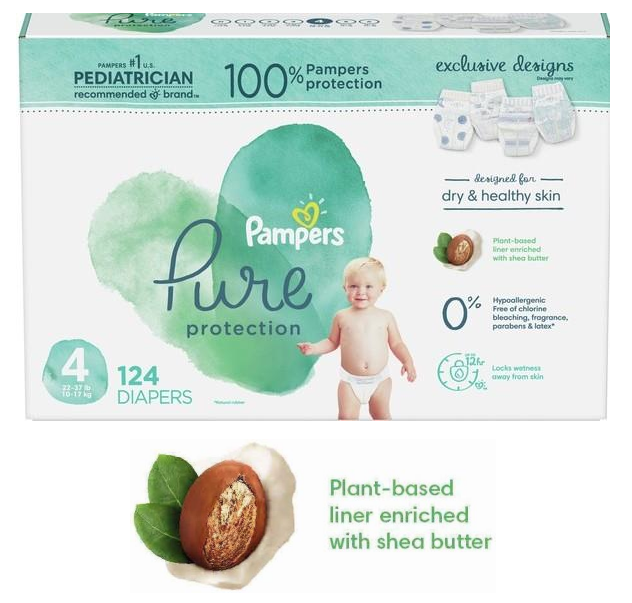Pampers Pure Protection Diapers Not as Plant-Based as Advertised, Class Action Claims
Almanzar v. The Procter & Gamble Company
Filed: November 7, 2021 ◆§ 1:21-cv-09196
A class action alleges Pampers-brand Pure Protection disposable diapers with a plant-based liner enriched with shea butter are misleadingly labeled.
New York
A proposed class action alleges Pampers-brand Pure Protection disposable diapers with a plant-based liner enriched with shea butter are misleadingly labeled in that the product is not nearly as “plant-based” as consumers are led to believe.
 The 14-page lawsuit contends that although the label for Pampers Pure Protection diapers prominently displays shades of green and a green heart symbol and states that the products’ plant-based liner is enriched with shea butter, the Pure diapers’ liner is comprised of only 22 percent bio- or-plant-based materials, compared to the 78 percent of ingredients that come from fossil carbon, or petroleum.
The 14-page lawsuit contends that although the label for Pampers Pure Protection diapers prominently displays shades of green and a green heart symbol and states that the products’ plant-based liner is enriched with shea butter, the Pure diapers’ liner is comprised of only 22 percent bio- or-plant-based materials, compared to the 78 percent of ingredients that come from fossil carbon, or petroleum.
The suit charges that a reasonable consumer would have no way of knowing the Pure Protection diapers are made with only 22 percent plant-based materials, and would most likely not consider that to be the case since a liner “seems to be the most significant part of the diaper.”
“Even though the label states, ‘Plant-based liner enriched with shea butter,’ consumers will not know the percentage of the Product’s weight the liner constitutes,” the lawsuit says, arguing that other label representations, such as the heavy use of green and the word “Pure,” lead consumers to expect that a higher percentage of plant-based materials was used in making the diapers.
Moreover, the case says other product label representations, including “Hypoallergenic—Free of chlorine bleaching, fragrance, parabens & latex*,” also lead consumers to believe the diapers’ plant-based content is greater than it is, if only because the absence of these elements is typically associated with natural plants, per the suit.
According to the complaint, the assertation that the Pure diapers’ plant-based material content is only 22 percent comes from lab analysis based on the ASTM D6866, Standard Test Methods for Determining the Biobased Content of Solid, Liquid, and Gaseous Samples Using Radiocarbon Analysis.
Per the case, the FTC has stressed that consumers may interpret renewable materials statements “differently than marketers may intend,” and companies have been urged to carefully qualify any “made with renewable materials” claims. Included in the complaint is an example used by the FTC with regard to how companies should be cautious when claiming products are comprised of renewable materials:
“The FTC offers an example of a company marketing its flooring as ‘made with renewable materials.’
Reasonable consumers ‘likely interpret this claim to mean that the flooring also is made with recycled content, recyclable and biodegradable.’
However, unless the flooring is ‘made with recycled content, recyclable, and biodegradable,’ this ‘made with renewable materials’ claim is misleading.”
The responsibility rests with Pampers manufacturer The Procter & Gamble Company to support any express and reasonably implied claims from its marketing, the suit argues.
“By promoting the ‘Plant-based liner,’ coupled with the other representations, reasonable consumers will expect a higher amount of plant-based materials,” the lawsuit says, claiming the Pure diapers have “only slightly more plant-based materials” than standard-variety Pampers diapers not touted as plant-based.
The complaint emphasizes that reasonable consumers “must and do rely on a company to honestly identify and describe the components, attributes, and features of a product,” and alleges P&G has gained an advantage over consumers looking to buy a product made with a higher percentage of plant-based materials.
The lawsuit looks to represent consumers in New York, North Dakota, Kansas, West Virginia and Wyoming who bought Pampers Pure Protection diapers with a plant-based liner enriched with shea butter within the statute of limitations period.
Get class action lawsuit news sent to your inbox – sign up for ClassAction.org’s free weekly newsletter here.
Video Game Addiction Lawsuits
If your child suffers from video game addiction — including Fortnite addiction or Roblox addiction — you may be able to take legal action. Gamers 18 to 22 may also qualify.
Learn more:Video Game Addiction Lawsuit
Depo-Provera Lawsuits
Anyone who received Depo-Provera or Depo-Provera SubQ injections and has been diagnosed with meningioma, a type of brain tumor, may be able to take legal action.
Read more: Depo-Provera Lawsuit
How Do I Join a Class Action Lawsuit?
Did you know there's usually nothing you need to do to join, sign up for, or add your name to new class action lawsuits when they're initially filed?
Read more here: How Do I Join a Class Action Lawsuit?
Stay Current
Sign Up For
Our Newsletter
New cases and investigations, settlement deadlines, and news straight to your inbox.
Before commenting, please review our comment policy.